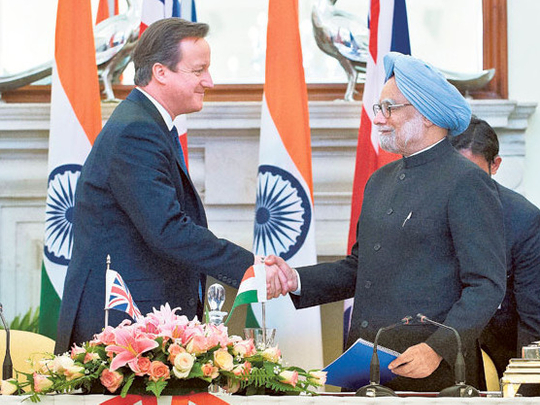
During his trip to India, British Prime Minister, David Cameron, visited Amritsar in Punjab and laid a wreath at a memorial for a historical massacre committed by British troops in 1919, described by Mahatma Gandhi as one that “shook the pillars of the British empire”. Cameron considered that massacre “shameful”, but did not apologise for it.
Semi-apology? Whatever you describe it as, nobody considered this gesture as an apology. An Indian speaker for a fund for the victims considered writing a message in the guestbook: “Incomplete gesture”.
Cameron is the first British Prime Minister to do this, but before him, Queen Elizabeth had paid a visit to the same memorial in 1997 and laid a wreath. So what makes British leaders visit this memorial in India? Is it the heavy burden of guilt? Maybe, but if Cameron or any other British politician is in favour of putting to rest the tragic chapters in Britain’s long colonial history, the list is actually far too long.
Britain never apologised for its colonial past. It is not just a question of massacres or victims in India or other erstwhile British colonies. Britain’s colonial history is strewn with acts that human conscience cannot accept. Two years before the Jallianwala Bagh massacre, an English public servant called Arthur James Balfour, on November 2, 1917, had issued a declaration stating the following: “His Majesty’s Government view with favour the establishment in Palestine of a national home for the Jewish people and will use their best endeavours to facilitate the achievement of this object...” Soon after, in December that year, General Edmond Allenby’s forces occupied Jerusalem. What makes this event a gross transgression of ethical standards is that the British, who occupied another country, gave that country to someone else. The simple question that arises here is: Who gave the British the right to grant someone what they themselves did not own or deserve to have?
It has been 96 years of continued bloodshed and loss of innocent lives since the Balfour declaration and yet no British politician has had the courage or ethical standard to utter a few words to the Palestinians whose lands have been plundered because of Britain’s colonial policies. Not even a few words like those voiced by Cameron during his recent visit to Amritsar.
If such a move or gesture is unlikely, then western leaders can at least take an ethical stand on the 5,000 Palestinian prisoners on hunger strike in 18 Israeli prisons following the death of one of the prisoners in Israeli custody. These leaders are tongue-tied when it comes to the issue of the Palestinians. None of them will ever ask himself or herself: Why are there 5,000 Palestinian prisoners in Israeli jails in the first place? Why did one of them die in detention?
Instead, we have to listen to these western leaders or their envoys when they visit us and give us long lectures on human rights and their justification of their wars as a means to defend freedom and human rights.
Human rights and ethical considerations as propagated by the West neither include Palestinians as victims nor do they consider Israelis as the worst occupiers in history. For the West, Israel is an exception. Western leaders ought to watch an Israeli documentary film called The Gatekeepers. In this film, they will get to hear six former heads of the dirtiest Israeli intelligence organisation — the Shin Bet. These former intelligence officials admit that Israel conceded defeat, politically and ethically, by occupying the West Bank and Gaza. In that film, Cameron and the rest of the western leaders will hear from some of those responsible for consolidating the Israeli occupation and brutally oppressing Palestinians for decades, calling for peace with Palestinians. And if they still have any doubts about Israel’s commitment to western human rights and ethics dictionary, they should listen carefully to Abraham Shalom, one of the six speakers in the film, who says: “Our hearts became cruel and we became like ferocious beasts towards Palestinians under the pretext of combating terrorism.”
Ethics may not stand in the way of interests and if we understand that bagging big trade deals in India and attracting the million-plus votes of Britons of Indian origin is a good reason to lay a wreath at the site of a colonial massacre, then we can also understand why all western leaders will be tongue-tied when it comes to Israel. Western leaders are motivated only by interests and not ethics. Ethics are just a means of bargaining.
Mohammad Fadhel is a Bahraini writer and media consultant based in Dubai.







